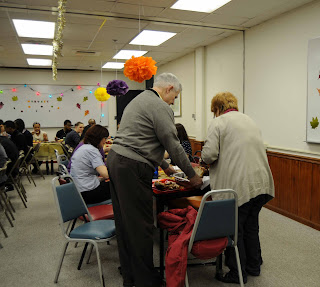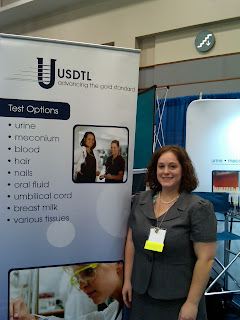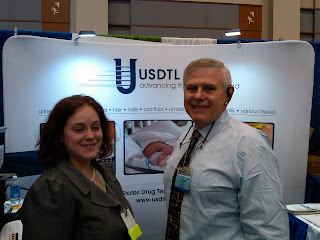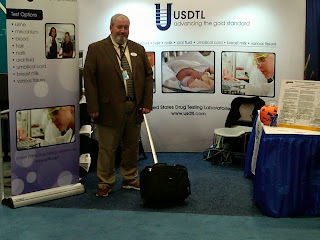USDTL Antenatal Screening for Alcohol and Substance of Abuse
Showing: United States Drug Testing Laboratories
 Drug and alcohol abuse occurs in all segments of society. A recent survey from the Substance Abuse and Mental Health Services Administration reported that among pregnant women, aged 15 to 44 years 4.4% used illicit drugs in the previous month, 10.8% reported alcohol use, and 4.7% admitted binge or heavy drinking. Substance abuse is a contributing factor to a variety of developmental and behavioral conditions. A substance abusing mother is more likely to neglect her newborn.
Drug and alcohol abuse occurs in all segments of society. A recent survey from the Substance Abuse and Mental Health Services Administration reported that among pregnant women, aged 15 to 44 years 4.4% used illicit drugs in the previous month, 10.8% reported alcohol use, and 4.7% admitted binge or heavy drinking. Substance abuse is a contributing factor to a variety of developmental and behavioral conditions. A substance abusing mother is more likely to neglect her newborn.
Pregnancy may be the one time in a woman’s life when she would be open to treating important issues like drug and alcohol abuse. Addiction is a serious disease that can improve with treatment. Current identification methods rely on maternal self-report, use of a universal screening tool, or positive urine toxicology results. Maternal self-report may be limited by concerns about social stigma or possible legal implications. Screening tools require skill and training to develop effective interview techniques. Urine toxicology is not an effective tool in identifying alcohol abuse and has limited value with drugs. With the exception of marijuana, urine generally provides a 1-3 day window of exposure for illicit drug use. Therefore; the most effective antenatal drug or alcohol treatment program includes objective drug testing to monitor relapse.
Drug and alcohol toxicology test methods are a key component of any treatment program. USDTL offers customizable drug test panels in a variety of sample matrices, hair, nails, blood, urine, oral fluid, meconium, and umbilical cord sections. The laboratory provides a confirmed test result for a specific drug or metabolite. The unique test panels help identify a growing problem of polysubstance abuse.
Visit our website at https://www.usdtl.com/ for more information.
Our Clinical Projects Manager, Bob Demaree, will be in San Diego at the World Symposium of Perinatal Medicine. Stop by booth number 305 and learn more about our screening tests for alcohol and substances of abuse during the antenatal period.
If you can’t be there, Bob will also be in Washington D.C. this weekend Dec 4-6 for the Hot Topics in Neonatology meeting.
Visit our website: https://www.usdtl.com/ for information about all the services we provide.
At United States Drug Testing Laboratories we celebrate the foods and cultures of all our members.

Carving the turkey

Our party planners
Happy Thanksgiving!
This weekend, our President and Scientific Director, Douglas Lewis, Executive Vice President Veronica Lewis and Marketing Communications Manager, Nancy Parra attended the IPN/PRN meeting at the Ritz Carlton on Amelia Island, Florida. They connected with old friends and spoke about our latest alcohol biomarker tests and the science behind them. The meeting went well with many local associations and treatment centers interested in our materials and tests. Their goal is to help their clients. Our tests give them objective answers to difficult questions.
At the same time, our Clinical Projects Manager, Bob Demaree exhibited at the Interventions in Neo Care conference in Las Vegas. Bob met with old friends and new and discussed our latest assay the CordStat® EtOH that tests for an alcohol biomarker in umbilical cord tissue. The presence of this biomarker can mean that the mother had risky alcohol behavior in the last weeks of her pregnancy.
If you met with us, and even if you didn’t, and have any questions please call us at 800-235-2367. We will be happy to help.
Bob Demaree, Clinical Projects Manager at USDTL is at The Fetus & Newborn: State-of-the-Art Care conference in Las Vegas, NV this week. He welcomes every attendee to stop by and learn more about our newborn testing. More importantly our newest assay which can measure an alcohol biomarker in umbilical cord tissue.
Fetal alcohol exposure has been recognized as the leading cause of preventable mental retardation and birth defects. Each year in the United States approximately 40,000 alcohol exposed newborns are diagnosed with Fetal Alcohol Spectrum Disorder. This condition can result in a variety of physical, behavioral and learning disorders. A recent SAMHSA survey reviewing data collected in 2009-2010 reported that 4.7 percent of pregnant women admitted binge or heavy drinking. Early identification is a key factor to improving outcomes for this group. Currently, identification relies on maternal
self-report or the presence of a set of unique physical characteristics. Self-report has limited value in determining alcohol exposure and the physical characteristics may not appear until later in child’s development.
A positive result from our CordStat EtOH is an indication of risky alcohol drinking behavior in the last two to four weeks of pregnancy.
To find out more call customer serivce at 800.235.2367.
Q: How long do I have to dispute a result?
A: USDTL saves negative specimens for seven days after initial accessioning. Seven days is longer than the customary three days that most labs retain negatives. This duration should allow clients a reasonable time to decide if dispute resolution is needed, to contact customer service and initiate the process. Positive specimens are stored frozen for one year following accessioning. Our Client Services Representatives will provide you with the necessary paperwork for you to sign and return to initiate the re-test process. Once the paperwork is in order, Client Services will return a re-test result to you in one to two working days. If you have any questions after receiving the results, please contact Client Services and they will either assist you or direct you to one of our forensic toxicologists to discuss the case with you.
October 31st, 2011, The American Academy of Pediatrics sets a new policy telling doctors that screening for drug/alcohol use should be a routine part of a teen’s regular doctors visits –http://bit.ly/roWQux
My question is, if adults lie to their healthcare providers about their alcohol and drug use, why wouldn’t teens? Why not recommend an unbiased-test based on a hair or nail sample. This would give pediatricians a solid factual history to help improve the health of their patients.
We offer a wide variety of hair and nail testing that can identify actual use or misuse and possibly save a life.
Check out our website: https://www.usdtl.com/ for more information.
Our fabulous staff, including our knowledgable toxicologists President Douglas Lewis and Vice President Laboratory Services, Joseph Jones, are at Booth #2108 to discuss our latest research in alcohol biomarkers and our new CordStatEtoh test.
Also there are fabulous Forensic Account Executive, Patrick Lavelle, and Sales Associate and all around Girl Friday, Victoria Lewis.


.jpg)
Stop by and say hi!
Follow us on twitter @USDTL Hashtag #APHA
“Like” us on Facebook www.facebook.com/USDTL
Partnering with USDTL for Professional Health Services
We care for the Health and Well-being of Healthcare Professionals
Healthcare professionals’ health and well-being is a prerequisite for quality healthcare. USDTL provides partnership opportunities for Health Service Organizations to develop customized tests for screening and monitoring their members. These tests provide HSOs with detailed information to help achieve their goal of improving the lives of those in the healthcare community.
Who We Are:
Established in 1991 as a specialty drug testing facility, USDTL quickly became a leader in the drug testing industry. Our laboratory has an aggressive research and development program and has made significant breakthroughs in the field of analytical toxicology by developing procedures to provide workplace and rehabilitation drug testing using hair and nail specimens. USDTL’s research activities are funded largely by agencies within the National Institutes of Health. We offer specialty, customizable, drug testing for a variety of clinical and research customers, including hospitals, reference laboratories,universities and court systems.
USDTL is continually developing new methods to improve test panels.
Our services go beyond providing alcohol and drug testing results. Businesses, physician health programs, and government agencies depend upon us for drug and alcohol monitoring. University research groups look to us to help meet their research needs. In all these areas, we provide complete analytical testing solutions.
Douglas Lewis, President, and Joseph Jones, Vice President of Laboratory Operations, have over 40 years of experience in forensic toxicology between them and are available to answer questions regarding reported results. Sharing forensic toxicology knowledge is considered an essential part of USDTL customer service.
What We Do:
We offer cutting edge testing for Alcohol Use Detection and Substances of Abuse Monitoring. We provide client services worldwide for healthcare facilities, child protection agencies, the U.S. government, legal services, rehabilitation and treatment centers, businesses and other clinical and forensic laboratories. We partner with organizations; such as, universities and government agencies, to assist with their research projects. USDTL is certified by the College of American Pathologists (CAP) and the New York State Department of Health.
USDTL has been on the cutting edge of substances of abuse testing since 1991. Our goal is to screen for addiction to save a life.
As one Doctor said at the ASA, “Too bad Michael Jackson didn’t take your test. He might be alive today.”
This week Newsweek Magazine ran an article on how dangerously addictive propofol can be.
Newsweek Magazine tells the why and how propofol (the drug they think helped kill the King of Pop) can be dangerously addictive.
http://www.thedailybeast.com/newsweek/2011/10/16/propofol-michael-jackson-s-killer.html
Another headline of note that came out this week: Benzodiazepine abuse accounts for almost one third of the emergency room visits in America. Benzodiazepine abuse is the most common prescription drug abused and is involved in one-quarter of all suicide attempts.
USDTL is here to help. Helping to save lives is our mission. Researching future assays in drug and alcohol screening is our vision. Visit https://www.usdtl.com/ for more information.
http://addictionbenzodiazepines.com/
- Umbilical Cord Tissue Testing for SSRIs
- A Comparison of Turnaround-Times for Two Popular Specimen Types Used for Newborn Toxicology: Meconium and Umbilical Cord Tissue
- Using Umbilical Cord Tissue to Identify Prenatal Ethanol Exposure and Co-exposure to Other Commonly Misused Substances
- Toxicology as a Diagnostic Tool to Identify the Misuse of Drugs in the Perinatal Period
- Specimen Delay
- Drug Classes and Neurotransmitters: Amphetamine, Cocaine, and Hallucinogens
- Environmental Exposure Testing for Delta-8 THC, Delta-9 THC, Delta-10 THC, and CBD
- Bromazolam and Synthetic Benzodiazepines
- October 2024 (5)
- March 2024 (1)
- February 2024 (1)
- January 2024 (3)
- December 2023 (1)
- November 2023 (1)


